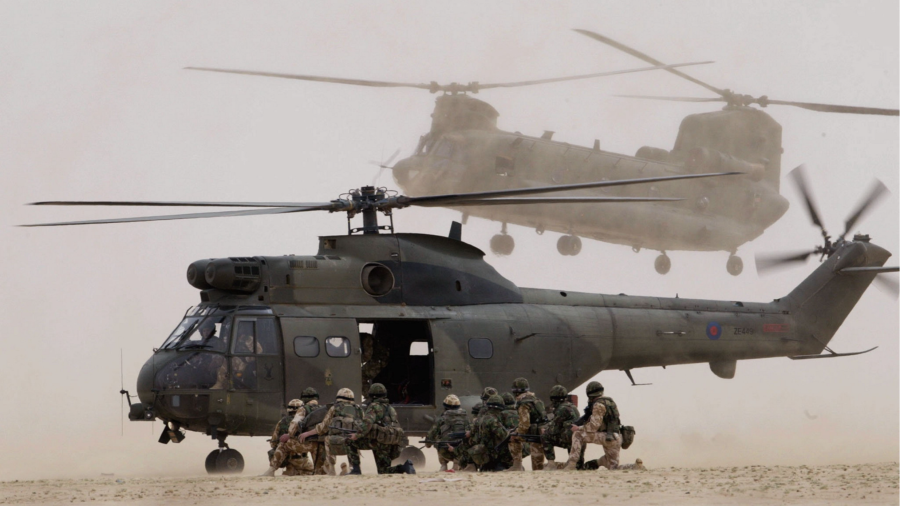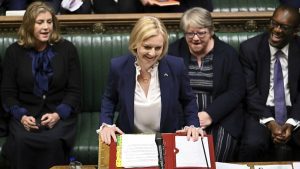
Three of the world’s biggest defence contractors are lining up bids to replace Britain’s workhorse battlefield helicopter in a test of a new procurement approach that will judge offers on their “social” impact as well as capability and price.
Airbus, Leonardo UK and Lockheed Martin are among the companies vying to replace the ageing Puma support helicopters. The £1bn-plus contract, for up to 44 new machines, is expected to be awarded next year.
It will be one of the first competitions to test what last year’s defence industrial strategy promised would be a more “strategic approach” to procurement.
Critics of Britain’s defence procurement, which has long been dogged by the dilemma of how to encourage competition and ensure value for money while ensuring a viable domestic industry, hope it will lead to lasting change.
Instead of pursuing its decades-old mode of “global competition by default”, the new strategy promised it would in future also make economic and social factors a core part of the selection process in defence procurement bids.
“We will sustain and grow onshore industrial capability and skills for the future in those areas most critical to defence and security, supporting economic growth across the union and improving the competitiveness of our companies in the global market,” the strategy said.
Ministers had already made “social value” a key criterion in evaluating any big government contracts in September 2020 but the new strategy went a step further by embedding social value into defence procurement policy. A minimum 10 per cent weighting towards the social value of a contract will be applied in competitions.
The importance of spending on British-based companies has taken on greater urgency in the post-pandemic, post-Brexit economic recovery — and as a tool for the government’s levelling up agenda to raise productivity across the UK.
Trevor Taylor of the defence think-tank the Royal United Services Institute (Rusi) said: “This is a real test of the [strategy’s] commitment to a more ‘nuanced’ approach to competition. The government is now also trying to take into account what a contract would do for the maintenance of industrial capability and for a contribution to national and regional prosperity.”
Previous research by Rusi has shown that “for every £1mn spent by the MoD with a UK-based firm, the Treasury got back more than 35 per cent in the form of income tax from employees, national insurance, corporation tax and VAT”.
Retaining onshore capabilities is critical if the UK is to be able to make modifications or upgrades to equipment in the future, said Francis Tusa, editor of Defence Analysis.
“The UK has increasingly to be far more selfish as regards its national interests in defence equipment,” he said. “The ability to have onshore capabilities to react to a changing environment is key. You don’t get that if you just buy off-the-shelf American [equipment].”
The MoD said the contract would be awarded to the tender that “offers the best value for money when assessed against a robust set of criteria, including social value”.
The department confirmed last year that the Royal Air Force would retire its fleet of 23 Puma helicopters, which were built in the early 1970s.
Upgraded versions have been used to carry troops in wars in Iraq and Afghanistan. The so-called new medium-lift helicopter would replace the Puma as well as three other types.
The contest will again put the spotlight on Britain’s only helicopter factory in Yeovil, Somerset, part of the former Westland business but now wholly owned by Leonardo UK.
The company, which will field its AW149 helicopter, has promised to build a new production line at Yeovil and introduce digital manufacturing skills as part of a £1bn investment programme.
Leonardo has also committed to ensuring that up to 70 per cent of the platform’s content and through-life support is carried out in the UK by itself and other domestic suppliers.
A recent report published jointly with the Purpose Coalition, which seeks to improve social mobility in the UK and is chaired by Justine Greening, former education secretary, sought to emphasise Leonardo’s role in contributing to the levelling-up agenda in the economy.
“You can do [the new helicopter] by investing in a one-off and delivering it or by investing in those who create and generate intellectual property in this country and have done for many years,” said Norman Bone, chief executive and chair of Leonardo UK.
“If we base the 149 here in the UK, then all future exports will come from here. So this is important for us, but also for the UK economy.”
Yeovil will not close if it does not win the competition but Bone concedes that there will be an impact. “We would have a sustainability issue for some parts of our facility at Yeovil.”
Airbus has similarly committed to fulfilling any export orders from the UK if it wins the competition. The European aerospace and defence group, which has teamed up with Babcock International and Spirit AeroSystems among others, is offering a militarised version of its H175 helicopter already in service with civilian operators. A production line will be set up at Broughton, Wales, where the company builds wings for its commercial aircraft.
Lenny Brown, managing director of Airbus Helicopters in the UK, said: “The real key is where the intellectual property and design expertise comes in and that will be in the militarisation of the aircraft. We will be doing all that in Broughton.”
Lockheed Martin, meanwhile, whose subsidiary Sikorsky Aircraft makes the successful Black Hawk helicopter, has so far held off saying whether it will bid and which industrial partners might be involved.
The US company said it was “aware of the UK government’s social value requirements and meeting this need will be an important element of our bid, when submitted”.
The competition could yet be disrupted by a wild card entrant: a British start-up called AceHawk Aerospace, which is offering second-hand Black Hawks with an updated cockpit and optimised to the government’s requirements. Based at Teesside International Airport, the company’s pitch is that of a “British Black Hawk”.
Its executives said they would “give the guy on the ground exactly what they need” in terms of operational capability, while at the same time creating jobs in the north-east — a notable part of the former Labour heartlands known as the red wall that were won by the Tory party in the last general election.
“The politics is in the social value,” said Mark Bate, head of business development at AceHawk.
“If the government wants to demonstrate to the people of the country that it is serious about levelling up . . . this [choosing AceHawk] is what the Conservatives need to do.”

